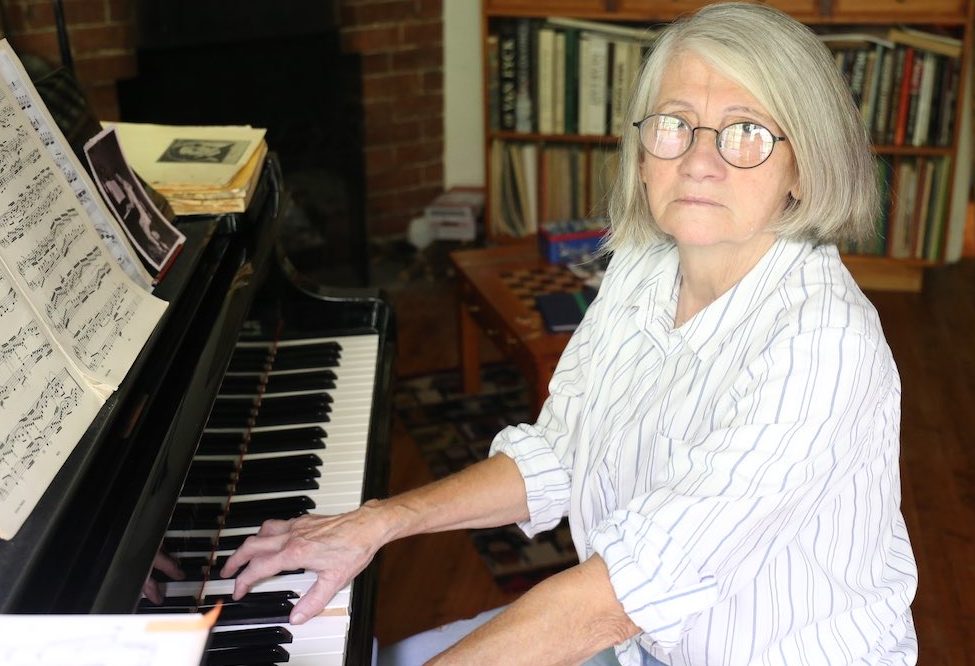
AN elderly pensioner facing eviction by Housing ACT was given 10 minutes to explain why she should remain in her home of 41 years, during a process the former ACT Chief Minister Jon Stanhope has described as “appalling”.
Yvette van Loo, 74, feels “horribly” disappointed by the impersonal approach adopted by a panel formed to decide whether she gets to stay in the social housing property she calls home.
Ms van Loo arrived at her scheduled hearing on Thursday (July 14) expecting to meet the members of the government-appointed Tenant Relocation Exemption Panel in a face-to-face setting.
However, the panel had other ideas, preferring to conduct the meeting via Zoom from an adjacent room.
While panel members sat together in one room at the Housing ACT office, Ms van Loo sat in another, small room, in front of a laptop computer accompanied by her support person, Jon Stanhope.
“I couldn’t believe it,” says Ms van Loo.
“I was expecting to meet the panel in person, but it was a Zoom meeting.
“It felt as if I wasn’t even there, like I was a speck of dust on a computer screen.”
Ms van Loo says she was given a mere 10 minutes to explain why she should remain in the Ainslie home she has raised her family in over the past four decades.
“Ten minutes to explain my whole life, and why I want to stay in my home,” says Ms van Loo. “It was so rude, so mind-boggling, and so unfair.”
Ms van Loo’s Cowper Street home has been earmarked for sale as part of an unpopular public housing “Growth and Renewal” program.
In February the grandmother was one of more than 300 social housing tenants – including elderly people, people with disability and people with chronic health issues – that received letters from Housing ACT saying they would have to move from their home.
Following community backlash over the implementation of the scheme, affected tenants were given the opportunity to appear before a panel and request an exemption.
Mr Stanhope says the panel’s approach showed a distinct lack of respect for Ms van Loo in the way in which they chose to conduct the meeting.
“I was stunned that a public service process in relation to an issue that was fundamentally important as this, was so loose, there was no structure to it, it was a nothingness and it left me feeling appalled,” says Mr Stanhope.
Mr Stanhope argued it wasn’t appropriate to hold a Zoom meeting when they were present in the same building as members of the panel.
“It was impersonal that an elderly person for whom English is a second language, a person who is fragile and faces the prospect of losing her home was put in a small room with a laptop, and told that five people who have the future of her life in their hands were sitting in another room,” he says.
“The fact that you couldn’t even make eye contact with the people who were central to making a decision about your life was intimidating. I felt as if there was a conscious structure in place of the powerful and powerless, exacerbated by the inability to be able to make eye contact.”
Mr Stanhope was also critical of the reluctance of the panel to engage directly with Ms van Loo about the substance of her appeal.
“I think Yvette did not understand that the whole meeting was premised on the basis that she would make a statement and an appeal, whereas she went to the meeting expecting them to ask her questions in order to better understand her concerns about losing her home,” says Mr Stanhope.
“There was silence which then led Yvette to say aren’t you going to ask me some questions? To which four members of the five member panel indicated they had no questions to ask.
“And that was it.”
ACT Council of Social Service CEO Emma Campbell says Ms van Loo would have found the way the meeting was conducted as intimidating, and thrown by the fact she wasn’t getting a face-to-face meeting.
“I think that many of the tenants were grateful that the panel was established so they could appear in front of the people themselves to share their story and express what a huge impact this would have on them,” says Ms Campbell.
“Many of these individuals are not accustomed to communicating via Zoom.
“They should also have been given the opportunity to appear in person. There are plenty of covid-safe measures we can take to enable that to be done safely.”
Ms Campbell fails to see how 10 minutes is an adequate time for any applicant to put forward a compelling case.
“In a matter as complicated as this, where the decision made will have a very profound impact on the life of the individual who is appealing for an exemption, there should not be a time limit placed on the proceedings. It creates stress for the vulnerable person,” says Ms Campbell.
“I’m also surprised the panel did not invite the tenant to share her story and to find out more about the impact of this decision on her because that’s the role of the panel.”
Ms van Loo says she’s been put through personal torment as a result of the scheme.
“The stress is unbearable, and I haven’t been able to concentrate on anything,” says Ms van Loo.
She feels the entire process was little more than an exercise in rubber stamping a decision that appears to already be made by the panel.
“I don’t have to wait for the outcome because I know what the outcome will be. It will be no,” says Ms van Loo.
“All they want is to kick me out so they can get money, that’s all. It’s greedy and there’s no sympathy or empathy for the tenants.”
Who can be trusted?
In a world of spin and confusion, there’s never been a more important time to support independent journalism in Canberra.
If you trust our work online and want to enforce the power of independent voices, I invite you to make a small contribution.
Every dollar of support is invested back into our journalism to help keep citynews.com.au strong and free.
Thank you,
Ian Meikle, editor





Leave a Reply